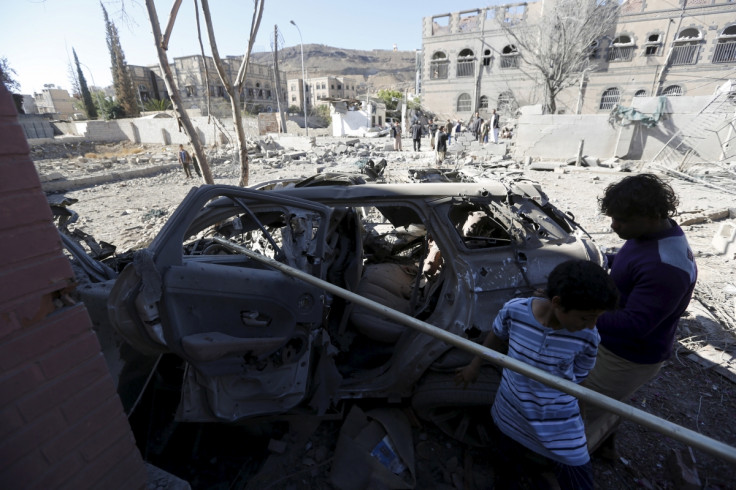40 civilians killed in Saudi Arabia air strikes on Yemeni market

Saudi-led air strikes on a market near the Yemeni capital, Sanaa, have killed at least 40 people. The raids were aimed at Shi'ite rebels, but they mainly resulted in the death of civilians, according to security officials.
The strikes hit the Nehm district, northeast of Sanaa on 27 February. "Several Saudi-led airstrikes directly struck people gathered in a crowded market in Nehm district of Sanaa province and killed about 45 civilians while 50 others were injured at the scene," said one resident.
Burned corpses lay strewn across the scene and the rebel-controlled Saba news agency published pictures of children being treated for their injuries. The coalition is yet to comment.
Multiple air strikes
Witnesses added that multiple strikes took place in a bid to annihilate both civilians and emergency crews. "The air bombing targeted the popular market in Nehm at first and then returned back to hit the rescuers in double-tap air strikes," a witness told the Chinese state news agency Xinhua.
Yemen, one of poorest countries in the Arab world, is enduring a battle for control between pro-government forces and Houthi rebels.
The northern Shi'ite Muslim rebels forces, known as the Houthis, say they aim to establish a thriving democracy where minorities can co-exist peacefully. But Riyadh accuses Iran of providing military support, in order to secure allied Shi'ite state near Saudia Arabia. The Iranian government denies this.
Saudi Arabia is leading a coalition which supports President Abd-Rabbu Mansour Hadi, who was elected in 2012 and is generally backed by the international community. Hadi has been based in the southern port city of Aden since July.
European arms sales
More than 6,000 people have been killed by fighting since March 2015, according to the UN.
Campaigners are urging governments to stop the sale of billions of dollars of deadly weapons to Saudi Arabia as it continues to pound Yemen. France, Germany, Italy, Montenegro, the Netherlands, Spain, Sweden, Switzerland, Turkey, UK and the US reported licences and sold more than $25bn (£18bn) of weapons to Saudi Arabia in 2015, according to the Control Arms Coalition. This included drones, bombs, torpedoes, rockets and missiles.
"Thousands of Yemeni civilians have been killed and injured in devastating and indiscriminate Saudi coalition air strikes, and there's strong evidence that further weapons sales to Saudi Arabia are not just ill-advised but actually illegal," Amnesty International UK's arms controls director, Oliver Sprague said earlier this week.
"[British Prime Minister David]Mr Cameron should stop acting as a cheerleader for BAE's reckless arms sales and stop the flow of weapons to the Saudi war machine pending the outcome of both a UN inquiry into the bloody conflict in Yemen and the UK's own review of its arms exports to Saudi Arabia."
© Copyright IBTimes 2025. All rights reserved.





















